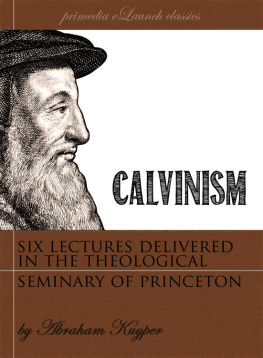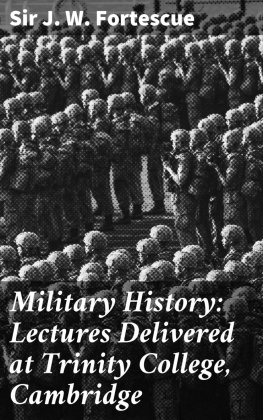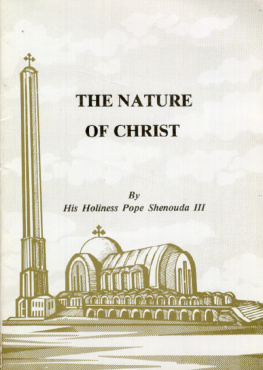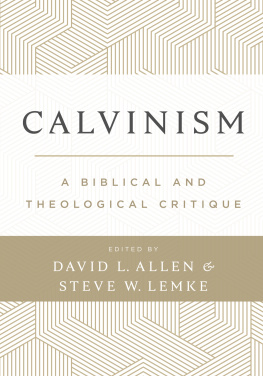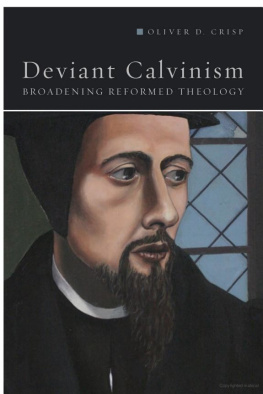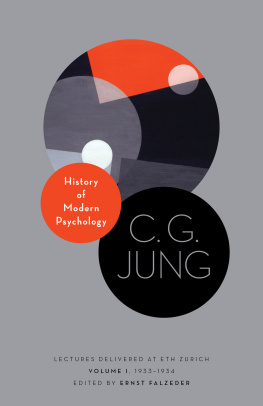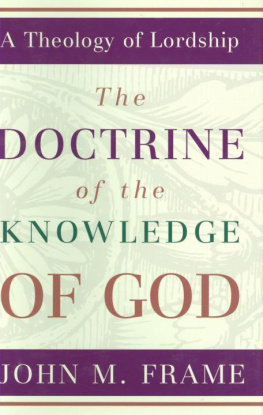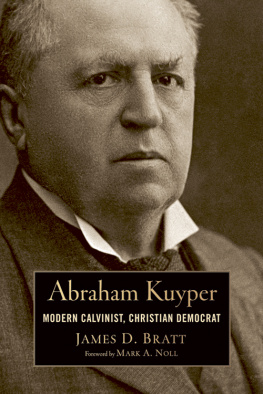Abraham Kuyper - Calvinism : six lectures delivered in the Theological Seminary at Princeton
Here you can read online Abraham Kuyper - Calvinism : six lectures delivered in the Theological Seminary at Princeton full text of the book (entire story) in english for free. Download pdf and epub, get meaning, cover and reviews about this ebook. City: New York, year: 1899?, publisher: Fleming H. Revell Co, genre: Religion. Description of the work, (preface) as well as reviews are available. Best literature library LitArk.com created for fans of good reading and offers a wide selection of genres:
Romance novel
Science fiction
Adventure
Detective
Science
History
Home and family
Prose
Art
Politics
Computer
Non-fiction
Religion
Business
Children
Humor
Choose a favorite category and find really read worthwhile books. Enjoy immersion in the world of imagination, feel the emotions of the characters or learn something new for yourself, make an fascinating discovery.
- Book:Calvinism : six lectures delivered in the Theological Seminary at Princeton
- Author:
- Publisher:Fleming H. Revell Co
- Genre:
- Year:1899?
- City:New York
- Rating:3 / 5
- Favourites:Add to favourites
- Your mark:
- 60
- 1
- 2
- 3
- 4
- 5
Calvinism : six lectures delivered in the Theological Seminary at Princeton: summary, description and annotation
We offer to read an annotation, description, summary or preface (depends on what the author of the book "Calvinism : six lectures delivered in the Theological Seminary at Princeton" wrote himself). If you haven't found the necessary information about the book — write in the comments, we will try to find it.
Calvinism : six lectures delivered in the Theological Seminary at Princeton — read online for free the complete book (whole text) full work
Below is the text of the book, divided by pages. System saving the place of the last page read, allows you to conveniently read the book "Calvinism : six lectures delivered in the Theological Seminary at Princeton" online for free, without having to search again every time where you left off. Put a bookmark, and you can go to the page where you finished reading at any time.
Font size:
Interval:
Bookmark:
Calvinism
SixLectures Delivered in the Theological Seminary at Princeton
TheL.P. Stone Lectures for 1898-1899
ByAbraham Kuyper, D.D., LL.D., M.P.
Contents
ATRAVELLER from the old European Continent, disembarking on the shore of thisNew World, feels as the Psalmist says, that His thoughts crowd upon him like amultitude. Compared with the eddying waters of your new stream of life, theold stream in which he was moving seems almost frost-bound and dull; and here,on American ground, for the first time, he realizes how so many divinepotencies, which were hidden away in the bosom of mankind from our verycreation, but which our old world was incapable of developing, are nowbeginning to disclose their inward splendor, thus promising a still richerstore of surprises for the future.
Youwould not, however, ask me to forget the superiority which, in many respects,the Old World may still claim, in your eyes, as well as in mine. Old Europeremains even now the bearer of a longer historical past, and therefore standsbefore us as a tree rooted more deeply, hiding between its leaves some morematured fruits of life. You are yet in your Springtide; we are passing throughour Fall; and has not the harvest of Autumn an enchantment of its own?
But,though, on the other hand, I fully acknowledge the advantage you possess in thefact that (to use another simile) the train of life travels with you soimmeasurably faster than with us; leaving us miles and miles behind; still weboth feel that the life in Old Europe is not something separate from life here;it is one and the same current of human existence that flows through bothContinents.
Byvirtue of our common origin, you may call us bone of your bone,-we feel thatyou are flesh of our flesh, and although you are outstripping us in the mostdiscouraging way, you will never forget that the historic cradle of yourwondrous youth stood in our old Europe, and was most gently rocked in my oncemighty Fatherland.
Moreover,besides this common parentage, there is another factor which, in the face ofeven a wider difference, would continue to unite your interests and ours. Farmore precious to us than even the development of human life, is the crown whichennobles it, and this noble crown of life for you and for me rests in theChristian name. That crown is our common heritage, It was not from Greece orRome that the regeneration of human life came forth,-that mighty metamorphosisdates from Bethlehem and Golgotha; and if the Reformation, in a still morespecial sense, claims the love of our hearts, it is because it has dispelledthe clouds of sacerdotalism, and has unveiled again to fullest view the gloriesof the Cross. But, in deadly opposition to this Christian element, against thevery Christian name, and against its salutiferous influence in every sphere oflife, the storm of Modernism has now arisen with violent intensity.
In1789 the turning point was reached.
Voltaire'smad cry, Down with the scoundrel, was aimed at Christ himself, but this crywas merely the expression of the most hidden thought from which the FrenchRevolution sprang. The fanatic outcry of another philosopher, We no more needa God, and the odious shibboleth, No God, no Master, of theConvention;-these were the sacrilegious watchwords which at that time heraldedthe liberation of man as an emancipation from all Divine Authority. And if, inHis impenetrable wisdom, God employed the Revolution as a means by which tooverthrow the tyranny of the Bourbons, and to bring a judgment on the princeswho abused His nations as their footstool, nevertheless the principle of that Revolutionremains thoroughly anti-Christian, and has since spread like a cancer,dissolving and undermining all that stood firm and consistent before ourChristian faith.
Thereis no doubt then that Christianity is imperiled by great and serious dangers.Two life systemsare wrestling with one another, in mortal combat. Modernism is bound to build aworld of its own from the data of the natural man, and to construct man himselffrom the data of nature; while, on the other hand, all those who reverentlybend the knee to Christ and worship Him as the Son of the living God, and Godhimself, are bent upon saving the Christian Heritage. This is the struggle inEurope, this is the struggle in America, and this also. is the struggle forprinciples in which my own country is engaged, and in which I myself have beenspending all my energy for nearly forty years.
Inthis struggle Apologetics have advanced us not one single step. Apologists haveinvariably begun by abandoning the assailed breastwork, in order to entrenchthemselves cowardly in a raveling behind it.
Fromthe first, therefore, I have always said to myself, If the battle is to befought with honor and with a hope of victory, then principle must be arrayedagainst principle; then it must be felt that in Modernism the vast energy of anall-embracing life-system assails us, then also it must be understood that wehave to take our stand in a life-system of equally comprehensive andfar-reaching power. And this powerful life-system is not to be invented norformulated by ourselves, but is to be taken and applied as it presents itselfin history. When thus taken, I found and confessed, and I still hold, that thismanifestation of the Christian principle is given us in Calvinism. In Calvinismmy heart has found rest. From Calvinism have I drawn the inspiration firmly andresolutely to take my stand in the thick of this great conflict of principles.And therefore, when I was invited most honorably by your Faculty to give the Stone-Lectureshere this year, I could not hesitate a moment as to my choice of subject.Calvinism, as the only decisive, lawful, and consistent defence for Protestantnations against encroaching. and overwhelming Modernism; this of itself wasbound to be my theme.
Allowme, therefore, m six lectures, to speak to you on Calvinism.
1. On Calvinism as aLife-system;
2. On Calvinism andReligion;
3. On Calvinism andPolitics;
4. On Calvinism andScience;
5. On Calvinism andArt; and
6. On Calvinism and theFuture.
Clearnessof presentation demands that in this first lecture I begin by fixing the conceptionof Calvinism historically. To prevent misunderstanding we must firstknow what we should not, and what we should, understand by it. Startingtherefore from the current use of the term, I find that this is by no means thesame in different countries and in different spheres Only in this last-named, strictly scientific sense do I desire to speak to youon Calvinism as an independent general tendency, which from a mother-principleof its own, has developed an independent form both for our life and for ourthought among the nations of Western Europe and North America, and at presenteven in South Africa.
Thedomain of Calvinism is indeed far broader than the narrow confessionalinterpretation would lead us to suppose. The aversion to naming the Churchafter a man gave rise to the fact that though in France the Protestants werecalled Huguenots, in the Netherlands Beggars, in Great Britain Puritansand Presbyterians, and in North America Pilgrim Fathers, yet all theseproducts of the Reformation which on your Continent and ours bore the specialReformed type, were of Calvinistic origin. But the extent of the Calvinisticdomain should not be limited to these purer revelations. Nobody applies such anexclusive rule to Christianity. Within its boundaries we embrace not onlyWestern Europe, but also Russia, the Balkan States, the Armenians, and evenMenelik's empire in Abyssinia. Therefore it is but just that in the same way weshould include in the Calvinistic fold those Churches also which have divergedmore or less from its purer forms. In her XXXIX Articles, the Church of Englandis strictly Calvinistic, even though in her Hierarchy and Liturgy she hasabandoned the straight paths, and has met with the serious results of thisdeparture in Puseyism and Ritualism. The Confession of the Independents wasequally Calvinistic, even though in their conception of the Church the organicstructure was broken by individualism. And if under the leadership of Wesleymost Methodists became opposed to the theological interpretation of Calvinism,it is nevertheless the Calvinistic spirit itself that created this spiritualreaction against the petrifying church-life of the times. In a given sense,therefore, it may be said that the entire field which in the end was covered bythe Reformation, so far as it was not Lutheran and not Socinian, was dominatedin principle by Calvinism. Even the Baptists applied for shelter at the tentsof the Calvinists. It is the free character of Calvinism that accounts for therise of these several shades and differences, and of the reactions againsttheir excesses. By its hierarchy, Romanism is and remains uniform. Lutheranismowes its similar unity and uniformity to the ascendancy of the prince, whoserelation to the Church is that of summus episcopus and to its ecclesiadocens. Calvinism on the other hand, which sanctions no ecclesiasticalhierarchy, and no magisterial interference, could not develop itself except inmany and varied forms and deviations, thereby of course incurring the danger ofdegeneration, provoking in its turn all kinds of one-sided reactions. With thefree development of life, such as was intended by Calvinism, the distinctioncould not fail to appear between a centre, with its fulness and purity of vitalityand strength, and the broad circumference with its threatening declensions. Butin that very conflict between a purer centre and a less pure circumference thesteady working of its spirit was guaranteed to Calvinism.
Next pageFont size:
Interval:
Bookmark:
Similar books «Calvinism : six lectures delivered in the Theological Seminary at Princeton»
Look at similar books to Calvinism : six lectures delivered in the Theological Seminary at Princeton. We have selected literature similar in name and meaning in the hope of providing readers with more options to find new, interesting, not yet read works.
Discussion, reviews of the book Calvinism : six lectures delivered in the Theological Seminary at Princeton and just readers' own opinions. Leave your comments, write what you think about the work, its meaning or the main characters. Specify what exactly you liked and what you didn't like, and why you think so.

